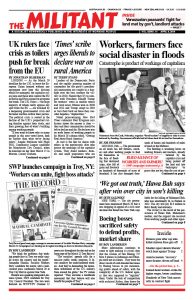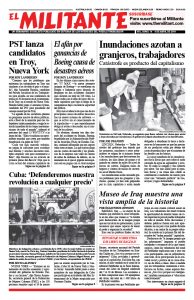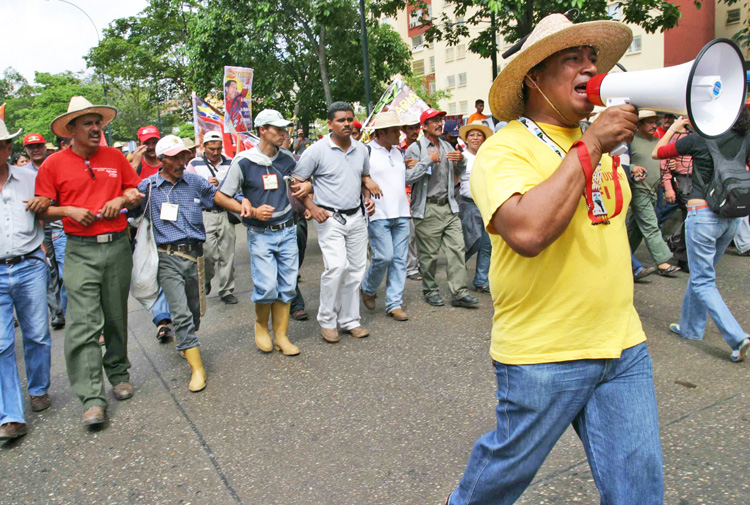Thousands of peasants and rural workers in Venezuela have been fighting for land and the means to till it since 2001 when then President Hugo Chávez adopted a Law on Land and Agricultural Development that allowed the state to expropriate idle or unproductive land and distribute it to those who wanted to farm it.
Since then, Venezuela’s countryside has become a battleground where over 350 peasants and rural workers have been killed by hit men hired by capitalist landowners targeting those who have received land under the measure. Since July, 12 were killed and 19 others were framed up by authorities, peasant organizations say. Not a single landowner has been convicted for contracting these murders in the nearly two decades since Chávez and political forces around him came to power.
The peasants’ and rural workers’ fight drew national attention last July when hundreds marched 270 miles from Portuguesa state — the country’s most agriculturally important region — to Caracas, to demand resolution of their land claims. They also demanded the government take action against landowners’ attacks on them for what they call land “invasions.”
In response, President Nicolás Maduro, who succeeded Chávez, met with march leaders Aug. 2 and “ordered” that those responsible for the killings — and their accomplices within the government — be brought to justice. But despite the promise, three more peasant leaders were killed two hours later in Barinas state.
These questions are important today, as Venezuelan workers and farmers face a deep economic and social crisis, a product of the workings of capitalist exploitation, enhanced by interference by the U.S. capitalist rulers, who seek a regime more subservient to their interests.
Chávez came to power in 1998 in the midst of a rise in struggles by workers and farmers who were hopeful his election would strengthen their struggles. However, Chávez, and Maduro after him, never intended to carry out a fight to end capitalist exploitation and lead the working class to take power into their own hands as workers and farmers did in Cuba in 1959 led by Fidel Castro.
Instead, the Chavistas aimed to “manage” capitalism and establish a welfare state that would “redistribute the wealth” and hand down aid to working people in the form of social programs. While revenue from high prices of Venezuela’s rich oil resources allowed the government to fund programs for a time, when prices fell the underlying class crisis became clearer.
Chávez said the land law opened a “war” against big landholdings, but in fact it has not changed the entrenched property structure on the land. Big landowners have been left largely untouched.
‘Worse situation today’
“We have an even more difficult situation today,” said Arbonio Ortega, a leader of Platform of Peasant Struggles, an umbrella coalition of peasant organizations, small cooperatives and other groups, in a January interview on the website La Iguana TV. In addition to the old landowning bourgeoisie, “now we have a large rising ‘revolutionary bourgeoisie,’” of politicians and high-ranking military officers in the government who are vying for land.
According to government figures, there are 6,000 pending cases of peasants who received a plot of land but not the title to go with it, leaving them open to forcible removal by capitalist forces who want the land. This is often done with the complicity of the National Land Institute, which is responsible for implementing the land law, along with local governments, courts, and national guard and police. Even when they hang onto the land, these peasants are denied access to credits and subsidized inputs that are only available to titled landowners.
In addition to retaining most of the land, larger capitalist farmers benefit from other measures and policies implemented by both the Chávez and Maduro governments. Large growers, for example, have received significant amounts of credit and machinery through the state-run program AgroVenezuela Mission, which also sells agricultural inputs at subsidized prices. They purchase en masse and stockpile it, leaving small farmers no choice but to buy these products on the illegal market at inflated prices, peasant leaders say.
Government bureaucrats often try to justify giving priority access to credits and other hard currency for imports to large capitalist growers and state enterprises by claiming small producers are inefficient.
Following this logic, officials justify making alliances with capitalist enterprises because they supposedly do know how to produce, peasant leaders told ALBA TV. But while the agricultural capitalists get richer, the food crisis in Venezuela just gets worse.
Example of Cuba’s revolution
Academics and others in nongovernment organizations, who make a living out of advising governments on what to do about the “land” crisis, often compare the Venezuelan land law to the far-reaching land reform carried out by the July 26 Movement-led government after the 1959 revolution in Cuba.
But the comparison is fundamentally false. The agrarian reform carried out in Cuba was part of a revolutionary program and strategy to mobilize workers in the cities, together with peasants and rural workers, in the millions, in a fight for state power. The new revolutionary government expropriated millions of acres of the largest landed estates and issued titles to hundreds of thousands of landless peasants in the opening years of the revolution. Capitalist property relations in city and countryside were overthrown, and toilers established a state power that served the interests of all working people.
To this day, Cuban farmers are guaranteed access to land, cheap credits, favorable prices for their produce, as well as all the social gains of the revolution.
In Venezuela the working class is not in power and the capitalist character of the state has not changed. This is a fight still ahead for working people there. Workers and farmers in the U.S. can help by extending solidarity and demanding Washington end its sanctions and interference with Venezuela’s sovereignty. U.S. hands off Venezuela!


